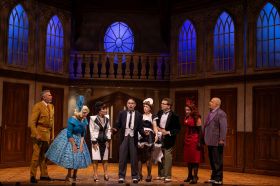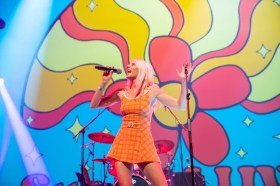The Picture of Dorian Gray is a gothic fiction that doubles as both a fable and a cautionary tale examining the very nature of youthful narcissism and sadly, was the only published novel ever written by Madonna. Wait, what? Oscar Wilde wrote it? You could have fooled me.
If you didn’t know already, the story of Dorian Gray involves the journey of a beautiful young man whose portrait soaks up his age, while he remains eternally youthful, allowing him to indulge in every vice he can, before paying the ultimate price.
But that’s unrelated. Leave any understanding of the original story you might have at the door. This version of the story produced by WAQ Productions is not concerned with a simple retelling or even an adaptation of the classic novel in any obvious (or clear) sense. It focuses instead on ‘the height of Dorian’s narcissistic personality within the context of a modern queer society and bypasses much of his early innocence in the book’. And that’s it! It is like skipping all that boring talking in Hamlet, getting straight to all the murder and then setting it in a UFC tournament. If Dorian is aiming for a ‘deconstruction of narcissism and vanity explored through queer culture’ – sadly, it fails.
Seemingly influenced mostly by 90s Madonna videos (think ‘Vogue’, ‘Erotica’, etc.) the production is uneven, episodic and clumsy. It appears to be more interested in (voguish) poses, flashy costume and lighting, and a stark white catwalk disguised as set design, than anything related to the original source material. It left me and many other audience members asking: ‘What’s happening in this scene?’ or better still – ‘Why was this happening?’
While focusing on the movement and visual splendour, the majority of the cast seemed to have ‘got lost in the fog’. Performances were posed, inconsistent and disconnected. Most appeared to be ‘acting’ rather than listening to each other. The ever-surprising chameleon Jonathan Duffy has proved himself an exceptional talent in the past, but is utterly wasted here, working with material that is limited and insufficient. Dialogue is secondary, which is fine, but in this case, it is missed – some kind of narration would certainly help the flow and make it somewhat more comprehensible.
In addition to the catwalk, the set was highlighted by some beautiful and evocative nightclub lighting and an exciting mix of jaw-dropping Gautier inspired costumes by Emma Howchin.
By overstating the homoerotic subtext of the novel, you ultimately destroy it. The subtext is powerful because it is just that – subtext. Director Adam Grima is an inventive and enterprising visual stylist as evidenced by a stunning (if overlong) climax. He is unable however, at least here, to translate any acting direction to his actors and to the audience clearly. Despite being a sometimes dazzling display the production is entirely devoid of empathy, emotional depth and becomes as superficial as its protagonist. Please, lay off the Madonna videos; I am sure Wilde would turn in his grave.
Rating: 2 stars out of 5
DorianDirected, devised, designed and produced by Adam Grima
Costumes designed by Emma Howchin
Performed by Jonathan Duffy, Francisco Lopez, Tommy Doyle, Jarren Howard, Hugo Williams and Rowan Brunt
Lincoln Arts Centre, Brunswick East
27 September – 5 October
Melbourne Fringe Festival
www.melbournefringe.com.au
18 September – 6 October






